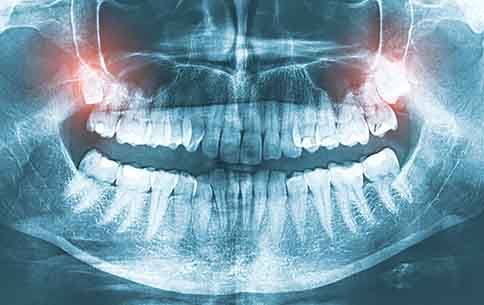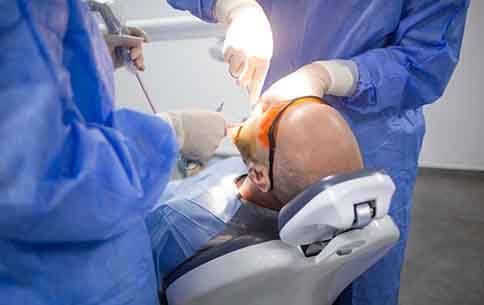Wisdom Tooth Extractions – Conway, SC
Quick & Comfy Wisdom Tooth Removal
It's generally best to keep all of your teeth, but third molars are often an exception. Leaving these pearly whites alone can cause health issues, putting your grin at risk. Thankfully, we at American Dental Care offer wisdom tooth extraction here in Conway. This procedure gets rid of your "extra" teeth, ensuring your smile remains safe, secure, and healthy. To learn more about it, please keep reading or book a consultation in the coming days.
Why Choose American Dental Care for Tooth Extractions?
- Dental Sedation That Keeps Patients Calm
- Gentle & Warm Dental Team
- CareCredit Financing Available
What are Wisdom Teeth?

Also known as “third molars,” wisdom teeth are the last ones to emerge. They typically erupt between the ages of 17 and 25 and sit in the back of your mouth.
Wisdom teeth are most notable for being largely unnecessary. While they once aided our human ancestors, they don't help people with modern diets. Still, not everyone gets such teeth – folks can have anywhere from none to all four of them. One’s third molars don’t always need removal, either.
Why Do Wisdom Teeth Need to Be Removed?

Wisdom teeth are only a concern when they threaten your smile. At that point, most dentists advise that they be removed to preserve your oral health.
Removal is most necessary when wisdom teeth lack space to erupt. Since people now have smaller mouths than their ancestors, they often don’t have room for third molars. That situation can cause third molars to become trapped in your gums, resulting in pain, infections, cysts, etc. An emerging wisdom tooth can also cause dental crowding, leading to a misaligned smile.
Often enough, patients who need wisdom tooth removal show signs like:
- Pain while eating
- Facial swelling
- Bad breath
- Jaw stiffness
- Difficulty opening the mouth
What to Expect from the Wisdom Teeth Procedure

Though wisdom tooth extractions vary by patient, they usually follow set steps based on whether the affected teeth have erupted.
Removal is fairly simple when the wisdom teeth have erupted. After numbing your mouth (using an anesthetic), our team will use an elevator to lift the relevant tooth. We’ll then rely on forceps to grip and wiggle it free of its socket.
If the wisdom tooth is impacted, you’ll need a more surgical approach. Talk to our team during your consultation to learn what that involves.
Recovering from Wisdom Teeth Extraction

Your mouth will feel a bit sore after your wisdom teeth are removed. To ensure you recover well, please use these after-care tips:
- Don’t drink through a straw for a few days.
- Take pain medications as needed.
- About 24 hours after surgery, rinse your mouth with salt water to clean the area.
- Avoid foods that are crunchy, hard, and sticky.
- Since they interfere with healing, stay clear of tobacco.
- Get ample rest for the best recovery time.
- During sleep, try to keep your head elevated.
- Use a cold compress or ice pack to decrease swelling.
Don’t hesitate to call us if something happens with your wisdom teeth. After all, we’re always ready to deal with third molars!
Wisdom Tooth Extractions FAQs
Is Wisdom Tooth Removal Painful?
This is hands down one of the most asked questions, especially by patients who struggle with dental anxiety or who have had a bad experience in the past. If this sounds all too familiar, then we have good news: wisdom tooth extractions do not hurt. We can say this with complete confidence because the first step of the treatment process is numbing your mouth thoroughly. We also share aftercare instructions, like keeping your head elevated and taking OTC pain medication as directed, so the recovery period goes smoothly as well.
Does Everyone Have Wisdom Teeth?
Actually, no! In fact, an article that was published in the Dental Research Journal estimated that between 5% and 37% of patients are missing at least one wisdom tooth. Since the prevailing theory is that genetics plays a role, you may be missing one or more of your third molars if that was the case for your parents or grandparents.
With all of that said, just because you can’t see your wisdom teeth doesn’t mean you don’t have them. That’s one of the many benefits of taking annual X-rays! With insight into what’s going on underneath your gums, Dr. Murph can easily monitor their development and let you know if they need to be extracted.
How Should I Prepare for My Wisdom Tooth Extraction?
We mentioned above what you should do after your wisdom tooth extraction, but is there anything you should do to prepare? The short answer is “yes!” Here are a few steps we recommend taking:
- Asking someone you know and trust to drive you to and from your appointment
- Pick up everything you need for the recovery period, including soft foods
- Avoid tobacco products, alcohol, and sugary foods
- Get a good night’s sleep the night before
- Choose something comfortable to wear on the morning of the procedure
Should Wisdom Teeth Be Removed If They Don’t Hurt?
Perhaps one of the biggest misconceptions about wisdom teeth is that they only need to be removed if they are causing immense pain and discomfort. The reality is that they can dramatically increase your risk of infection and other oral health problems if they get trapped underneath the gumline or there isn’t enough room for them in your mouth. Plus, even if they aren’t causing you any discomfort right now, they could in the near future.
How Soon Can I Eat After Wisdom Teeth Removal?
You need to wait until the numbing agent has completely worn off, which usually takes a few hours. Once you’ve regained full sensation in your mouth, you can eat. Just be sure to stick to extremely soft foods, like cottage cheese and vegetable broth. It’s also important to check the temperature beforehand since the extraction site and the area surrounding it will be extremely sensitive.

